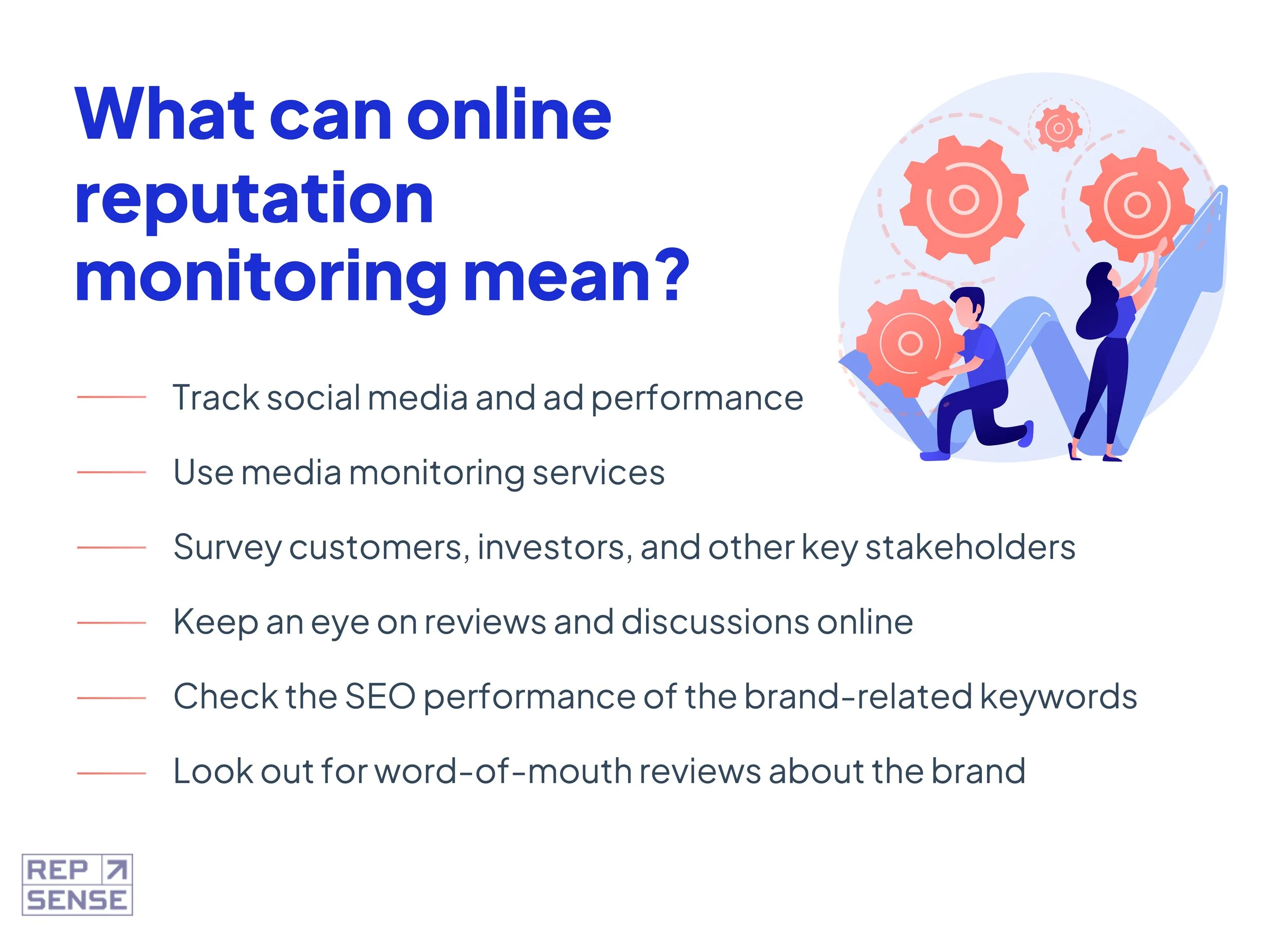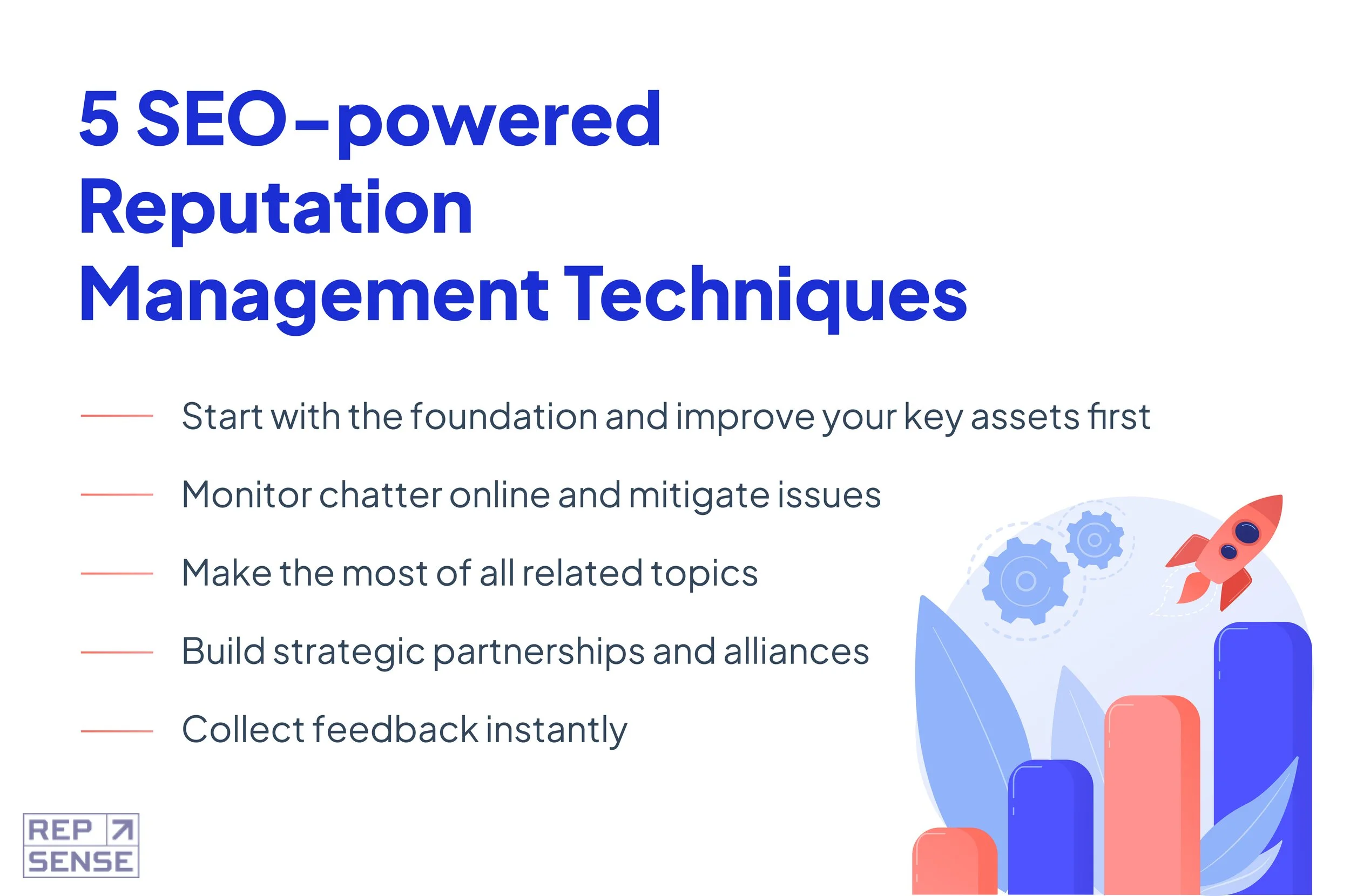Guide to SEO Reputation Management: 5 Helpful Techniques For Brand Growth
While good website positioning might be the main reason to invite an SEO manager to join your team, their role can surpass the traditional thinking of how SEO techniques can help communications and marketing teams.
Just as you position your website on the top of the SERP, you could also place your brand on the top of your customer's minds. You might wonder: "What should I do to make a good first impression when people Google my business?"
Enter SEO reputation management – the key that connects traditional branding, digital PR, and the latest online reputation management.
But before digging into how SEO strategies enhance traditional brand reputation management, let's glance at the bigger picture.
Why is online reputation management (ORM) critical?
Online reputation management (ORM) is an extension of the overall brand reputation strategy. Some might even argue that it's the most crucial part of it, especially for businesses that sell digital products.
ORM focuses on helping brands connect with their stakeholders, prevents minor issues from turning into public reputation crises, and helps to deal with reputation damage.
ORM solves problems that arise with transactive memory and our tendency to forget in the age of digital clutter. Search engines provide extra storage to keep information so we don't have to. While we store less information in our memories, we assume we can always double-check exact birthdays on Meta, facts on Google, or travel memories on Instagram.
The same goes with any brand-related stories—people will probably not remember the exact facts about your company, but they will surely do their own research before buying. Search engine results, online reviews, and a brand's social media profiles become core assets for brand awareness. Constantly looking up information online makes online content value skyrocket—that is, as long as it is placed correctly and continuously updated.
It all begins with online reputation monitoring.
Optimize with online reputation monitoring
Online reputation monitoring is the foundation of the overall ORM strategy, helping you make intelligent shortcuts toward your overall goal. Knowing how these shortcuts perform allows you to adjust your actions as you go. As a result, you can implement your strategy more easily, avoid most pitfalls, and achieve the goal faster.
Online reputation monitoring can come in many forms:
Tracking social media and ad performance
Using media monitoring services
Surveying customers, investors, and other key stakeholders
Keeping track of reviews and discussions online
Checking the SEO performance of the brand-related keywords
Looking out for word-of-mouth reviews about the brand.
Most of these activities require time, effort, and resources. And sole monitoring might not be enough – after all, it's all about what you do with the information you collect. And SEO reputation management strategies can help here. So, what could be the role of SEO in solving potential reputation issues?
Effective SEO for reputation management
SEO for reputation management can become a crucial tool for enhancing overall brand reputation. In essence, SEO practices tend to be very performance-driven. Every keyword you choose, every piece of content you promote, and every direction you take can be clearly measured.
With most SEO reputation management tools, it's possible to measure:
The interest in your brand, product or service, and related keywords
The brand searches, online image, and positive search results
The changing outlook toward your brand, leadership, and online assets
The impact one content piece can have on your overall brand
The most helpful and damaging narratives about your brand
The technical SEO issues
The value of your online assets, such as your website
The impact of SEO campaigns and other SEO efforts
SEO tools can tell you the search volume of your keywords, the most popular related phrases, the value of content pieces about your brand, or the clear rating of your website. All of these metrics inform the next steps to take.
Another helpful metric to track is Page Rank (PR) or domain authority. In SEO, PR defines the importance of a website. Using this system, search engines can clearly define the value of the website – for instance, a solid company page with tons of high-quality content might score 9 out of 10, while a poorly written one-pager will be ranked a 2.
Remember that Google's algorithm rewards high-quality content, complete with metadata and images. Correct usage will help you earn a featured snippet among the organic search results on Google search, bringing more attention to your business profile and overall brand.
SEO PR: online brand reputation management with a twist
Detailed monitoring is just a part of what makes SEO a helpful strategy for communications and PR managers. What other clever methods can you take from SEO and use in digital PR? In other words, how can the approach used by SEO experts help inform the overall brand reputation strategy?
To fully make use of SEO PR, keep in mind these pointers:
Start with proper brand hygiene. Most SEO managers will begin with the foundations – taking care of the brand's website, blog, social media, review sites, and other valuable online assets. Without the right foundations, there will be no place to bring back the backlinks, so most will begin with technical SEO and on-site SEO. A company's online presence influences customer's purchase decisions. Your reviews, website, social media, and other online assets need to be not only accessible but clear, recently updated, and on-brand. Brand managers must focus on curating a digital narrative that aligns with company values and resonates with the target audience. Taking care of the first page of search engines (SERPS) and ensuring your social media is active is the first step to having a welcoming online presence.
Monitor and mitigate. Every business will get a negative review occasionally, and the bigger the company, the more attention it will attract. The key here is the reaction to the study, which begins with a quick response. Sometimes, a brand reputation crisis can happen simply because of unaddressed issues – one upset customer can turn to social media or get their story published, and a topic that could be solved easily would backfire and make a lasting dent in reputation. SEO professionals know this, and naturally, they regularly keep an eye on the progress.
Cast a wide net to catch all brand keywords. SEO experts will always follow the customers and check what kind of language they use, which questions they have, and what keywords they care about. Incorporating reputation-focused keywords in your content boosts your visibility and shapes how your audience perceives you. While these SEO tactics are common in building blogs and growing organic traffic, they can be used in communications, too. Ensure that the content your leadership creates is always on top of the search page, that you cover your brand name and intent-related keywords, and that your website is clear, accessible, and easy to navigate. Keep in mind all types of search – including paid and organic search. Optimizing content for reputation helps to show that the company takes its online presence seriously.
Build strategic alliances. The hidden power of SEO is backlink building. Once you write an article that you post on your website, you start looking for other sources that would link to your content, especially news and high-traffic blog sites. The better the original article, the more chances you will get others to link to it. It involves connecting with industry leaders and publishers, connecting with them, and offering to collaborate. The more connections you make, the higher your chance of being mentioned. And it's not only about the value you provide – it's about making meaningful connections and building up communities of people in the same industry. As a brand manager, you probably already know that strategic partnerships can help you boost brand value. But if you have a valuable asset – such as an article, whitepaper, or online course – that is truly helpful, making new connections will be easier.
Collect feedback. Since SEO helps to monitor every mention of your brand online, you can quickly adjust your overall brand and even product strategy while listening directly to your customers. Feedback in the form of negative comments, positive reviews, or constructive think pieces will allow you to change your course – or fix any mistakes your company has made. Making a great first impression online might be a great place to begin, but continually monitoring and improving your products and services helps to ensure a positive online reputation for years to come.
Ready to use SEO reputation management techniques for your brand?
Repsense builds a brand reputation monitoring tool that utilizes the best PR, communications, SEO, and marketing techniques and helps brands become landmarks online.
Our algorithm is trained on 60,000 different sources and helps define how exactly your brand is seen online. Combine advanced monitoring with our personalized insights for the next steps—and you'll get a winning formula for your brand's success.
Book a free demo and begin your journey right away:



